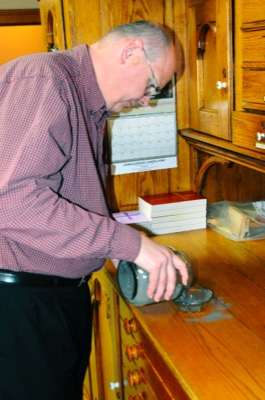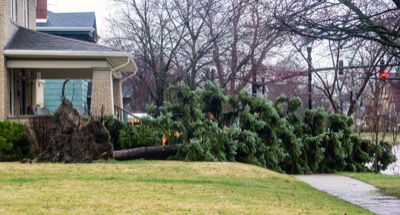Wednesday, March 1st, 2017
Solemn season of Lent begins
Rubbing of ashes on foreheads marks Ash Wednesday
By William Kincaid

Photo by William Kincaid/The Daily Standard
The Rev. Ken Schnipke of Immaculate Conception Catholic Church, Celina, pours out ashes to be blessed and dabbed on the foreheads of parishioners at Ash Wednesday services today. Christians all over the world are celebrating Ash Wednesday, the start of the Lenten season leading up to Easter.
CELINA - "Remember that you are dust, and to dust you shall return."
Many Christians today will hear those solemn words spoken as ashes are rubbed onto their foreheads. If they attend Ash Wednesday Mass at Celina's Immaculate Conception Church, officiated by the Rev. Ken Schnipke, they'll hear another phrase.
"Turn away from sin and be faithful to the Gospel."
Today begins Lent, a 40-day period of prayer, fasting and almsgiving in preparation for the celebration of the resurrection of Jesus Christ on Easter Sunday.
"To mark that season of penitence, we have the ashes," Schnipke said. "The ashes come from the palm branches from a previous (year's) Palm Sunday."
Palm branches in Christ's time signified glory, victory and triumph.
"That was part of the triumphal entry of Jesus into Jerusalem before his crucifixion and death. So the palms would have been like a praise," Schnipke said. "When you're in the Middle East, there's palm branches around so you wave them as kind of a sign."
The idea of using ashes traces back to the Old Testament, Schnipke said.
"The ashes were a reminder that we are dust and to dust we will return, a sign of our frailty of life and a need for repentance," Schnipke said. "So if somebody was a public sinner, they might be put in sackcloth and ashes as a sign of their public repentance for their sinfulness."
But it's not a practice exclusive to Catholics, Schnipke said.
"It used to be a Catholic thing. That's not true any more. Other churches will also do it," he said.
IC obtains its ashes from a church supplier in Dayton.
"We order the ashes when we need them from the church company, but they would do that process. They would use old palms," Schnipke said. "Sometimes people get these (palms) and they're blessed, so when there's something holy, you don't just throw it away."
Some parishioners return their palms to IC, where Schnipke will burn and add them to the ashes from the church supplier.
When Schnipke was pastor of a large parish in Florida from 1995-2000, church officials would collect their own palms for Palm Sunday.
"We would go out into the woods, get our palm branches and actually use them. You can't do that here," he said. "To get the good ones, you have to climb up the trees."
Before Ash Wednesday, parishioners were invited to take their palms from the previous year's Palm Sunday, which were then burned, ground down and refined.
"The challenge always was is that there is something that the church companies do that make them stick on your foreheads better," he said.
While some ash-bearers may wipe off the black smudge on their foreheads after church, others proudly keep it on.
"There's no requirement that they have to be on," Schnipke said. "The idea is that they do stay on as witness to other people about the importance of repentance in our life - conversion, change of heart."
Though Ash Wednesday marks the beginning of a journey toward repentance before the holiest day of the year, Easter Sunday, it's not a holy day of obligation.
"People are surprised by that. They would assume it's a holy day like the Feast of the Assumption, Feast of All Saints. It's not," Schnipke said. "But I think because of the traditional practice of it ... probably more people come for Ash Wednesday than most holy days."
Ash Wednesday Mass is an exciting time for children who can't partake of the Eucharist because they haven't made their first Communion. On Ash Wednesday, they get to come up to the front of the church to get ashes, with their parents, siblings and friends, Schnipke noted.
Lent focuses on three key activities: prayer, fasting and almsgiving, Schnipke said.
"Prayer leads us closer to God, that sense of fasting cleanses us and the almsgiving reaches out to other people," he said.
Many Catholics during Lent move to give up something - certain foods, candy, etc. Schnipke recommends Catholics tie prayer, fasting and almsgiving to whatever they vow to go without. For example, Schnipke might refrain from drinking soda and donate the money he would have spent on it to a charity.
"So then it's something that's conscious with me throughout the whole season," he said.
For others, giving up a gadget could help them spend more quality time with their families. Whatever people choose to do for Lent, Schnipke said, should be "tied to something that is meant to either cleanse part of our lives, somehow improve us in God's eyes and our relationship with other people, helping the community around us, the bigger picture of the world, those kind of things."
And ultimately, Catholics should enter Lent with a positive attitude and embrace the season as an opportunity to become better people and grow closer to Christ.
"Sometimes people see Lent as a downer ... because you've got to give something up," Schnipke said. "If you can turn around and see Lent as a time of transformation that cleanses us, makes us more pure for that gift of the Easter celebration, then it's something that is enriching, it's something to look forward to."




